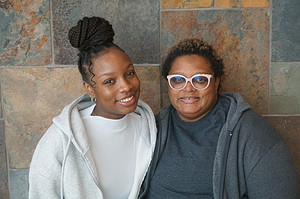View Larger Image

Cyncere Tidwell, 22, has hemoglobin SC disease, which is a type of sickle cell disease. But she hasn't let it slow down her life.
Image by Benjamin Waldrum
For Hot Springs Woman, Sickle Cell Disease “Didn’t Prevent Me from Doing Anything”
| After years of learning how to handle pain crises when they come and developing a routine for care, Cyncere Tidwell says sickle cell disease is just another part of her life.
“Other than the pain crises, sickle cell doesn’t bother me,” she said. “I’ve been dealing with it for so long that it’s nothing new now. I’m used to it. I don’t even tell people I have it unless it comes up in conversation. I don’t want to be looked at differently or treated differently.”
Tidwell, 22, of Hot Springs, has hemoglobin SC disease, which is a type of sickle cell disease. Symptoms include anemia, due to sickle cells breaking down much faster than regular red blood cells, and episodes of fatigue and extreme pain. The severity of the symptoms can vary from person to person.
Thankfully, there have been no serious pain crises for Tidwell since last summer, but she still deals with smaller ones at home, which she controls with pain medication and ibuprofen. She’s developed an internal sense of knowing when the pain is bad enough to go to the hospital.
“If it comes every single day, like for three days in a row, then obviously something’s wrong,” Tidwell said. “I need more [relief] than what I’m getting. If my pain meds I have at home aren’t helping then I know I need to go. I’d say that’s only once a year.”

Tidwell’s mother, LaTrice Collins (right), said “We wanted her to be a normal kid. We didn’t let sickle cell stop her.”Benjamin Waldrum
Tidwell’s mother, LaTrice Collins, and her grandmother, Kimberly Huff, both live in Hot Springs and have helped with her care since she was a little girl.
Collins said they use a common 1-10 scale to evaluate her daughter’s pain. “If it gets to be eight or above, we know it’s pretty much time [to go to the hospital].”
Pain crises were more common when Tidwell was growing up, but both she and her mother said they didn’t let it affect her life.
“It didn’t prevent me from doing anything, not really,” Tidwell said.
“We didn’t use it as a crutch,” Collins said. “Even if she was in pain, we let her go out and do whatever she wanted to do. We wanted her to be a normal kid. We didn’t let sickle cell stop her.”
Tidwell transitioned to the UAMS Adult Sickle Cell Clinical Program about a year ago, when she turned 21 and aged out of Arkansas Children’s pediatric sickle cell program. She comes to UAMS for checkups every three months.
“They do my blood levels and make sure I’m caught up on my meds, ask me if I’ve had a crisis,” Tidwell said. “Just kind of a check-in.” She hasn’t needed any blood transfusions as an adult but had “plenty” during her time at Children’s.
Tidwell thanked the sickle cell team for her care at UAMS, particularly nurses Rebecca Camp, APRN, and Stella Bowers, RN.
“I love her,” Tidwell said of Camp. “But we love Stella too,” her mother chimed in. “Yes, I love her too, but Rebecca is my favorite,” Tidwell said. “She’s so sweet.”
Both Tidwell and Collins agreed that stigma is an issue when treating sickle cell patients. During a pain crisis, sickle cell disease patients often seek immediate treatment for their pain in hospital Emergency Departments, where they are seen by physicians or resident physicians who have little experience treating patients with sickle cell disease.
“I just wish people would take it more seriously,” Tidwell said. “Just because you can’t physically see it on a person doesn’t mean anything. I work in a hospital, so I’ve seen other people speak about people with sickle cell. They don’t take it seriously.”
Collins mentioned the fact that the predominant number of sickle cell patients are African American. “That’s another reason it’s not taken seriously, I feel like,” Tidwell said. Racial bias, including seeing sickle cell patients as drug-seeking, are common barriers to care.
Tidwell stays grounded by focusing on her family and her hobbies. She regularly visits her two brothers, who live in Little Rock, and loves spending time with her niece and nephew. When she’s not spending time with her family she enjoys TV, shopping and movies. “I’m a real movie head,” she said. “Rom-coms are my favorite.”
She also spends time thinking about what’s next. A registered nurse, Tidwell works night shifts in labor and delivery at National Park Medical Center in Hot Springs.
“I want to become a traveling nurse — that’s my goal,” she said. “I would still want to be in labor and delivery, for sure. When the baby comes out, that’s the best part.”
Tidwell said she knows she wants a future outside of Arkansas. Although the possibilities are endless, she’s thinking about her favorite destinations, including New York and Hawaii. Seattle is high on her list because she loves the rain.
“I want to see where I’m going to end up,” she said.